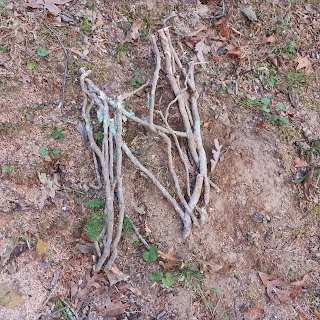Yesterday I made the trip to Bristol, Tennessee, where I preach and preside at Faith Lutheran each Sunday. Yesterday I left at 6:50 a.m.; I took a book with me, in case I got there very early and needed something to do. Google Maps told me that the optimum route would take me 2 hours and 10 minutes; it took me 2 hours and 45 minutes.
My spouse couldn't go with me yesterday because he's been recovering from the ways his body has been protesting all the chain saw work he did earlier in the week. I was feeling anxious, so I decided to print the Google Maps directions, in case I got to a part of the backcountry roads and lost cell phone service, which I assumed would mean losing GPS.
I started on I 26, with signs that said the road was closed at exit 3. I took the exit that got me to US 19, and that road was a 4 lane highway, straight and wide, with only one truck on it. I thought, well, this isn't too bad. There were trees blazing with autumnal color, and I thought, you wanted to experience autumn in the mountains--here you go.
Then I got on NC197, a two lane road, but still not bad. There were piles of debris here and there, a tree down here and there. I was behind an 18 wheeler and a box truck, but that was fine--I wasn't going to be zipping down these roads because I knew that they had only just been restored.
I got to Green Mountain, where the road ran by the North Toe River, and I saw so much devastation. I know I didn't take in the full extent of it because I was focusing on the road, which looked like it might crumble out from under us at any moment. The road had stacks of trees on either side, and I am fairly sure that crews just cut out the middle parts of fallen trees to be able to access the roads. On the other side of the river, railroad tracks had buckled and twisted, like some huge child had a temper tantrum.
As I went up NC226, up and up the mountain, I saw portions of the mountains where every tree had been flattened. Yet there were other sections in the next curve of the road that hadn't been touched, trees in full autumnal glory. The road got curvier, and I felt increasingly anxious--there was no shoulder at all, and the 18 wheeler truck ahead of me felt free to use both lanes to navigate the curves. What if there had been oncoming traffic?
Eventually, I pulled into the parking lot of Faith Lutheran. I felt frazzled, but took some deep breaths and pulled myself back together again. Just 20 miles earlier, I had been in Elizabethton, Tennessee, where a different river had overswept its banks and destroyed everything in its path. And here I was in Bristol, where the community was largely unharmed.
When I think of October, I think I'll remember this feeling more than any other: how can some of us suffer so much damage, while others of us (me, for example) emerge relatively unscathed?
On the way home, my smart phone routed me down I 26, and I decided to follow its instructions. If I was turned away and had to backtrack, I had time. The road was closed at exit 3, at Irwin, NC, but the detour was clearly marked. I got back on I 26 and went back across the mountains that way.
The damage at Irwin was as catastrophic as the news reports made it seem, with wrecked roads and houses no longer there, swept away when the Nolichucky River rose. I remember last winter when all the leaves were down, and I realized what the true contours of the river were, how some of the houses weren't too far away from that wide river. I think those houses are gone now.
There weren't many of us going across the mountains, but as I got closer to Asheville, traffic increased. I got gas at the station near my house. It's always crowded, because the price is cheap, but yesterday was worse than usual. I was glad to get home; I've been through hurricanes before, and I know there's a point when the "we're all in this together" phase of recovery shifts to despair and rage as the pace of recovery takes so very long.
At the end of the afternoon, with no fanfare at all, we realized that our internet had been restored. I spent the rest of the day, expecting it to go out again, but so far, it has held. I'm still boiling several pots of water a day, but that inconvenience is so minor, compared to the wreckage and ruin I witnessed yesterday.
A single picture and even a series of pictures can't really do justice to the scale of the wreckage and ruin. Neither can these words. I've seen article after article that tells of people swept away in the raging rivers. Those words, also, can't make sense of it all.
On some level, humans aren't equipped to make sense of destruction on this scale, whether caused by nature or caused by humans. But as with the pandemic, it makes sense to create a record of what I've seen. It may never be important to historians, but it's important to me to bear witness.





































